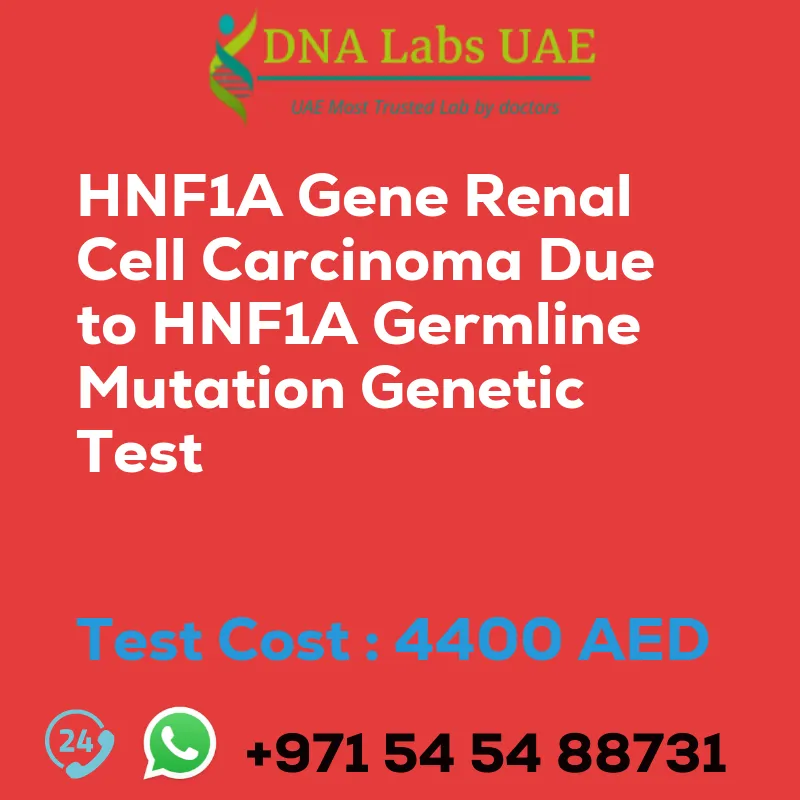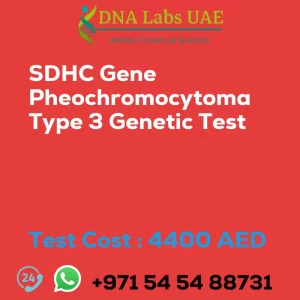HNF1A Gene Renal Cell Carcinoma: Understanding the Genetic Test
Renal cell carcinoma, a type of kidney cancer, can be associated with a germline mutation in the HNF1A gene. The HNF1A gene, also known as hepatocyte nuclear factor 1-alpha, plays a crucial role in the development and function of the kidneys.
About the Genetic Test
The HNF1A Gene Renal Cell Carcinoma genetic test is a valuable tool for diagnosing individuals with a predisposition to develop renal cell carcinoma due to HNF1A gene mutations. This test utilizes Next-Generation Sequencing (NGS) technology to analyze the DNA sequence of multiple genes simultaneously.
Test Components and Price
The cost of the HNF1A Gene Renal Cell Carcinoma genetic test is AED 4400.0. The test requires a blood sample or extracted DNA, or even just one drop of blood on an FTA card.
Report Delivery and Method
After the sample is collected, the report will be delivered within 3 to 4 weeks. The NGS technology is employed to perform the analysis and provide accurate results.
Test Type and Doctor
The HNF1A Gene Renal Cell Carcinoma genetic test falls under the category of cancer testing. An oncologist is the specialist who typically oversees this test.
Test Department and Pre-Test Information
The HNF1A Gene Renal Cell Carcinoma genetic test is conducted in the Genetics department. Prior to the test, it is important to gather the clinical history of the patient who is going for the test. Additionally, a genetic counseling session is recommended to draw a pedigree chart of family members affected by HNF1A Gene Renal Cell Carcinoma, due to HNF1A germline mutation NGS Genetic DNA Test gene HNF1A.
Importance of the Test
Identifying individuals with germline mutations in the HNF1A gene can have significant implications for their healthcare management. It helps guide treatment decisions, identifies other family members who may also be at risk, and provides information for genetic counseling and family planning.
If a patient is diagnosed with a predisposition to develop renal cell carcinoma due to HNF1A gene mutations, healthcare professionals can tailor their treatment plans accordingly. They can also offer support and guidance to other family members who may carry the same mutation, allowing for early detection and prevention measures.
Conclusion
The HNF1A Gene Renal Cell Carcinoma genetic test is a valuable tool in identifying individuals with a predisposition to develop renal cell carcinoma due to HNF1A gene mutations. It aids in making informed healthcare decisions, detecting potential risks in family members, and providing guidance for genetic counseling and family planning.
| Test Name | HNF1A Gene Renal cell carcinoma due to HNF1A germline mutation Genetic Test |
|---|---|
| Components | |
| Price | 4400.0 AED |
| Sample Condition | Blood or Extracted DNA or One drop Blood on FTA Card |
| Report Delivery | 3 to 4 Weeks |
| Method | NGS Technology |
| Test type | Cancer |
| Doctor | Oncologist |
| Test Department: | Genetics |
| Pre Test Information | Clinical History of Patient who is going for HNF1A Gene Renal cell carcinoma, due to HNF1A germline mutation NGS Genetic DNA Test. A Genetic Counselling session to draw a pedigree chart of family members affected with HNF1A Gene Renal cell carcinoma, due to HNF1A germline mutation NGS Genetic DNA Test gene HNF1A |
| Test Details |
HNF1A gene renal cell carcinoma refers to renal cell carcinoma (a type of kidney cancer) that is associated with a germline mutation in the HNF1A gene. HNF1A stands for hepatocyte nuclear factor 1-alpha, which is a transcription factor involved in the development and function of the kidneys. NGS (Next-Generation Sequencing) genetic testing is a method used to analyze the DNA sequence of multiple genes simultaneously. In the context of HNF1A gene renal cell carcinoma, NGS genetic testing can be used to identify germline mutations in the HNF1A gene. This testing can help diagnose individuals with a predisposition to develop renal cell carcinoma due to HNF1A gene mutations. Identifying individuals with germline mutations in the HNF1A gene can have important implications for their healthcare management. It can help guide treatment decisions, identify other family members who may also be at risk, and provide information for genetic counseling and family planning. |








